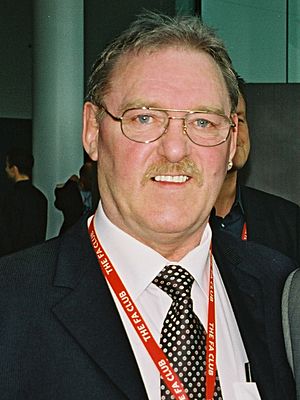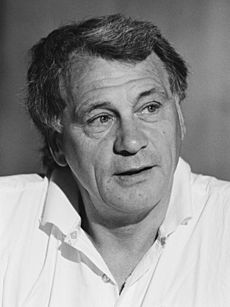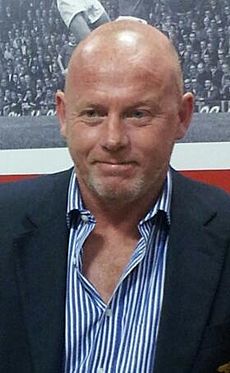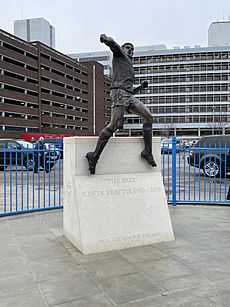Kevin Beattie facts for kids

Beattie in 2007
|
|||
| Personal information | |||
|---|---|---|---|
| Full name | Thomas Kevin Beattie | ||
| Date of birth | 18 December 1953 | ||
| Place of birth | Carlisle, England | ||
| Date of death | 16 September 2018 (aged 64) | ||
| Place of death | Ipswich, England | ||
| Height | 5 ft 10 in (1.78 m) | ||
| Position(s) | Centre-half | ||
| Youth career | |||
| 1971–1972 | Ipswich Town | ||
| Senior career* | |||
| Years | Team | Apps | (Gls) |
| 1972–1981 | Ipswich Town | 228 | (24) |
| 1982 | Colchester United | 4 | (0) |
| 1982 | Middlesbrough | 4 | (0) |
| 1983–1986 | Barnet | ||
| Harwich & Parkeston | |||
| 1983–1984 | Sandvikens IF | ||
| 1987 | Kongsberg IF | ||
| 1988 | Nybergsund IL-Trysil | ||
| Clacton Town | |||
| International career | |||
| 1972–1975 | England U23 | 9 | (1) |
| 1975–1977 | England | 9 | (1) |
| *Club domestic league appearances and goals | |||
Thomas Kevin Beattie (born 18 December 1953 – died 16 September 2018) was an English footballer. He played as a centre-half for many years. He spent most of his career at Ipswich Town. With Ipswich, he won both the FA Cup and the UEFA Cup. He was also named the first ever Professional Footballers' Association Young Player of the Year in 1973. Kevin Beattie even appeared in the movie Escape to Victory with some of his Ipswich teammates.
After he stopped playing football, he became a commentator for TV and radio. Many experts and fans have called Beattie Ipswich Town's best player ever. His manager, Bobby Robson, who also managed England, said Beattie was the best England player he had ever seen.
Contents
Early Life and Football Dreams
Thomas Kevin Beattie was born in Carlisle on 18 December 1953. He was one of nine children. He was known by his middle name, Kevin, because his father was also named Thomas. Kevin's mother worked as a cleaner, and his father delivered coal. His father used to play football as a goalkeeper. He even had a try-out with Aston Villa. But he chose to work for the Coal Board instead, as it paid more.
Kevin supported his local team, Carlisle United. He looked up to players like Hughie McIlmoyle. Kevin started playing football for his school team at St Cuthbert's Roman Catholic junior school. He began as a goalkeeper. His family could not afford football boots. But a kind teacher, Mr. Raffety, bought a pair for him. Kevin soon became a forward. He wanted to play like Chelsea's Peter Osgood.
Kevin passed his eleven-plus exams. But his family could not afford the grammar school uniform. So he went to St Patrick's Roman Catholic senior school. He played for Blackfriars, a local youth team. Mr. Raffety managed this team. From age 14, Kevin also played for a pub team with his father. Raffety told Carlisle United about him, but they did not have a youth team. Kevin was also told that Celtic was interested. But they were wrongly told he was not Catholic. He left school at 14. He then worked in factories and other places.
Club Career Highlights
Starting at Ipswich Town
When Kevin was 15, he played for two local teams. A football scout saw him play. He was offered a try-out with Liverpool. Kevin went to Liverpool and impressed the manager, Bill Shankly. Shankly invited him back to sign for the club. But when Kevin returned, no one from Liverpool met him at the train station. After waiting, he went home. Shankly later said missing out on Kevin was one of his biggest mistakes.
Soon after, Kevin joined Ipswich Town as an apprentice. Ipswich manager Bobby Robson made sure Kevin was met at the train station. He was taken all the way to Ipswich's Portman Road ground. Robson told his chief scout, "If you miss him, you've lost your job." When Kevin arrived, he was wearing his father's shoes. So Ipswich bought him new clothes. Kevin had played as a striker before. But Robson changed him into a defender, usually a centre-half. Kevin later said this change suited him well. He could see all the play in front of him.

Kevin started earning money. He tried to help his family by sending money home. He also tried to help his parents with family issues.
Playing for the Senior Team
Kevin made his first team debut at 18. It was against Manchester United in the first game of the 1972–73 season. Ipswich won 2–1. After the game, Kevin asked Manchester United's Bobby Charlton for his autograph. Charlton told Kevin that his playing reminded him of Duncan Edwards. He said that one day, Kevin would be the one signing autographs. Kevin scored his first league goal two weeks later. It was in a 3–3 draw with Leeds United. That season, he played 38 times for Ipswich and scored 5 goals. Ipswich finished fourth, their best finish since 1962. Kevin also helped Ipswich win the 1972–73 Texaco Cup. They beat Norwich City 4–2 over two games. He was named the first Ipswich Town Player of the Year.
The next season, Kevin played in a European competition for the first time. Ipswich was in the UEFA Cup. They won against Real Madrid, Lazio, and FC Twente. They then lost to Lokomotive Leipzig on penalties. Kevin scored his first European goal in that competition. He played in all 42 league games that season. He also played in 15 other cup games. He won the first Professional Footballers' Association's (PFA) Young Player of the Year award. He was also voted Ipswich's Player of the Year again. In the 1974–75 season, Kevin was captain for a game against his hometown team, Carlisle United. He played 52 games and scored 6 goals for Ipswich. He was chosen by other players for the First Division Team of the Year. He helped his club reach the semi-final of the 1974–75 FA Cup. Ipswich finished third in the league that season.
Kevin played 36 games for Ipswich in the 1975–76 season, scoring 4 goals. Ipswich finished sixth. Towards the end of the season, he started having back pain. He was selected for the First Division Team of the Year for the second year in a row. The 1976–77 season started well for Ipswich. They beat Liverpool and Manchester United. Ipswich then had a club record 7–0 win over West Bromwich Albion. Kevin's season was cut short by an injury he got at home. He was adding petrol to a bonfire. This caused a flare-up and gave him serious burns to his face and neck. He missed six matches. Before his injury, Ipswich was doing very well. But without Kevin, they lost four of their last six games. They missed out on winning the championship. He played 34 games for Ipswich that season, scoring 5 goals. He was chosen for the PFA Team of the Year for the third time in a row.
Kevin was fit for the start of the 1977–78 season. But a knee injury in a league match made him leave the England squad. He had damaged cartilage in his knee and needed an operation. After three weeks of rest, he returned to the Ipswich team. He played in the UEFA Cup home game against FC Barcelona. Ipswich won 3–0. Even though his knee reacted, he wanted to play in the next game. But Robson did not let him. Ipswich was knocked out of the cup. Kevin returned to the team for the FA Cup fourth-round game. Ipswich's league form was not good. But they were safe from relegation when they played West Bromwich Albion in the FA Cup semi-final. Ipswich won 3–1 and reached the final. The next day, his knee was swollen again. His chance to play in the final was uncertain. Robson did not announce the team until the last minute. Kevin was in the defence. Roger Osborne scored the only goal of the game, and Ipswich won the trophy! Kevin had special injections to help him play in the final. After winning the cup, he and two teammates were given the freedom of Carlisle. Kevin played 21 times for Ipswich that season.
Soon into the 1978–79 season, Kevin had problems with his other knee. He had two more operations. He spent a lot of time in treatment. He played 26 games that season, scoring twice. In the 1979–80 season, he played only 12 games. His recovery after matches took weeks. He also played a small part in the 1980–81 season. He sometimes played as a striker instead of his usual defender role. But his defensive play in the UEFA Cup against Bohemians was very important. He was named man of the match. Kevin played his last game for Ipswich in April 1981. It was an FA Cup semi-final loss to Manchester City. He broke his arm in that game. Ipswich won the UEFA Cup at the end of the season. But Kevin did not get a winner's medal. He was injured and did not play in the final. 26 years later, fans started a petition. Kevin was finally given a medal by UEFA president Michel Platini in 2008.
Kevin stopped playing football in December 1981 because of injuries. He had several knee operations.
Later Career Teams
In 1982, Kevin trained with Norwich City. But Ipswich did not want him to join their local rivals. So he joined another East Anglian team, Colchester United. He played six games for them. He then signed for Middlesbrough. He played five games there, scoring one goal. His time at Middlesbrough ended when he got a serious injury against Newcastle United.
Kevin then played for non-League club Barnet. He also played for Harwich & Parkeston to earn more money. He then moved to Sweden to play for Sandvikens IF. After that, he moved to Norway. He played for Kongsberg IF and scored many goals. In 1988, he played for Nybergsund IL-Trysil before returning to England. He also played for Clacton Town. Kevin worked as a scout for Norwich City and Portsmouth. His first coaching job was part-time at his hometown club Carlisle United in 2002–03. He later coached school children in the United States. His last coaching job was with Peterborough United.
International Career for England
Kevin Beattie played for the England under-23 team in 1972–73. His first game was in November 1972 against Wales under-23s. England won 3–0. He scored his only goal at this level in his final under-23 game, again against Wales.
Kevin made his senior England debut in April 1975. It was a 5–0 win over Cyprus at Wembley. Malcolm Macdonald scored all five goals. Kevin scored his only goal for England in May 1975. It was during a 5–1 win over Scotland. He played nine games for England between 1975 and 1977.
Style of Play
Kevin Beattie was known for his strength. This earned him the nickname "Beast". But he was also very good with the ball, which led to another nickname, "Diamond". Bobby Robson said he was "the quickest defender I ever saw... with a left foot like a howitzer". Perry Groves, who played with Kevin, said his only weakness was not being able to throw the ball far. Even when Kevin was older and had knee problems, he was still the fastest player over short distances.
During his time at Ipswich, Kevin played in defence with Allan Hunter. Robson called them 'Bacon and eggs'.
Life After Football and Passing
After his playing career, Kevin Beattie worked in broadcast media. He commented on football for BBC Radio Suffolk until the day before he passed away. He also helped write his autobiography, The Beat, which was published in 1998.
Kevin met his wife, Margaret Boldy, known as Maggie, when he was young. They married in 1974. Maggie had a long-term illness later in life. Kevin became her main helper. They had three daughters: Emma, Sarah, and Louise.
His football injuries caused him problems later in life. By the time he was 53, he could not walk very far because of knee issues. On 16 September 2018, Kevin Beattie passed away at 64 years old. He was survived by his wife and daughters. His funeral was held in Nacton. Former Ipswich and England player Terry Butcher called Kevin "the complete footballer". George Burley called him "a legend". John Wark, who called Kevin "Monster", said he was the best Ipswich player ever.
Legacy and Honours
Bobby Robson once said Kevin Beattie was the best England player he had seen. He believed Kevin could have been as good as Duncan Edwards. Kevin was added to the Ipswich Town Hall of Fame in 2008. He was voted Ipswich Town's "best ever player" many times. He is also one of Perry Groves' 20 "Football Heroes" in a book.
Kevin Beattie and some of his Ipswich teammates were in the 1981 film Escape to Victory. He was the body double for Michael Caine's character, showing off his skills on the pitch. They became friends. Kevin had a less friendly relationship with Sylvester Stallone, who also starred in the film. Kevin said, "There weren't too many that got on that well with him and after I beat him in an arm wrestle – first my right arm and then my left – he didn't speak to me again."
After his passing, a campaign started for a statue of Kevin Beattie outside Portman Road. This would be next to the statues of Robson and Ramsey. The design for the statue was shown in March 2019. The money to build the statue was raised by August 2019. On 18 December 2021, on what would have been Kevin's 68th birthday, his statue was officially unveiled outside Portman Road.
Honours
Ipswich Town
- FA Cup: 1977–78
- UEFA Cup: 1980–81
- Texaco Cup: 1972–73
Individual
- PFA Young Player of the Year: 1972–73
- Ipswich Town Player of the Year: 1972–73, 1973–74
- Football League First Division PFA Team of the Year (3): 1974–75, 1975–76, 1976–77
- Ipswich Town Hall of Fame: Inducted 2008
Images for kids
 | Bessie Coleman |
 | Spann Watson |
 | Jill E. Brown |
 | Sherman W. White |







